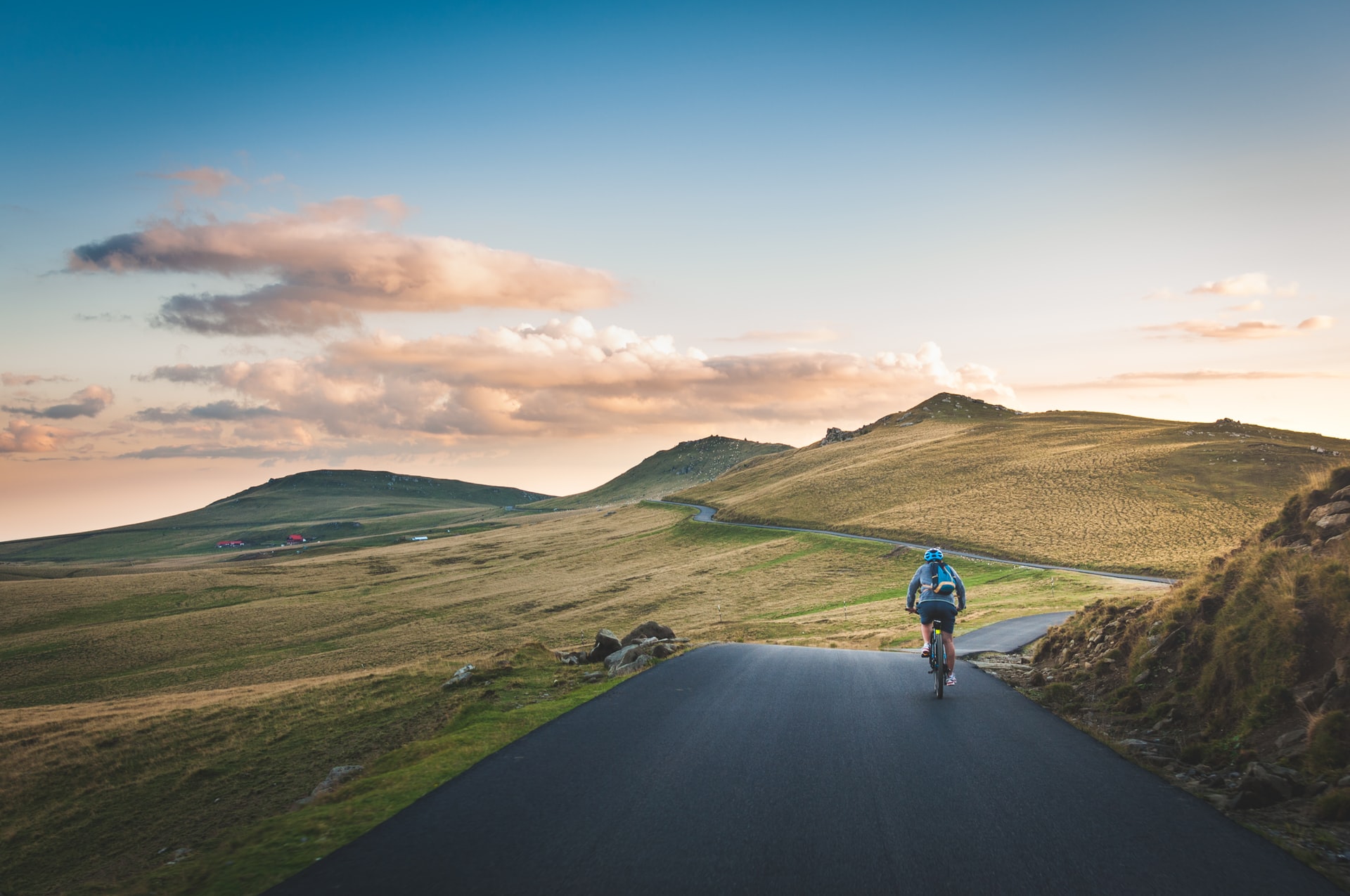Here’s how you can start traveling by bike
It’s not enough to know how to ride a bike to start traveling by yourself because you’ll face many difficulties like tiredness or soreness.
Author:Tyreece BauerReviewer:Karan EmeryMay 23, 202290K Shares1.2M Views

Traveling should be relaxing and mind-opening, but it’s easy to get stressed about your tickets or hotel reservations. Sometimes it’s more accessible to get a plane or discover new places by car, but if you want to spice up your life and try something new and exciting, you should try bike touring. If you already know how a bike works but are unsure if you can travel with it, here are some tips on how to start and what you need.
Train Yourself
It’s not enough to know how to ride a bike to start traveling by yourself because you’ll face many difficulties like tiredness or soreness. If you want to build endurance and enjoy the trip, here are some ways you can train your body to be prepared for long journeys:
- Adopt a stretching routine. You’re mostly using your leg muscles for riding, but you might get cramps often if you don’t have a warming-up routine. Training your calves, hips, and quads will give you more flexibility.
- Build strength. You don’t need equipment to build strength in your body, just regular bodyweight exercises like planks, pushups and squats. Keep in mind to start slow and give yourself time to recover to avoid muscle injuries.
- Build endurance. One of the best skills to have when riding a bicycle is endurance that can take you far if you’re well prepared. Taking longer rides from week to week and training on hills to improve your stamina will help you in this regard
- Pay attention to your alimentation, especially before and during cycling. You need to eat carbohydrates in order to have enough energy for physical training (like pasta). Then, you need to refuel to keep going with your adventure, so try having sports drinks and a banana with you at all times.
Be Prepared For Injuries
In a world dominated by cars, cyclists often struggle with being protected on the road. Therefore, accidents happen all the time, mostly because the cycling trend is rising; people are choosing this alternative for commuting, business or leisure purposes more than in the last ten years. At the same time, in the past years, the trend of severe injuries rose by 26%, and the most involved vehicles in these accidents are cars, light good vehicles and motorcycles.
You can file a bicycle claim in the UKif you’re injured while riding due to other traffic participants being negligent. To become eligible for compensation, you must prove that you suffered physical and psychological damages because of someone else. The proof can include anything from witnesses, footage at the accident place and pictures or videos that you can make. The compensation will cover the costs of repairing your bicycle, personal damages and any other care costs. Although you have a three-year limit to file the claim, a personal injury solicitor will help you overcome this situation.
Look For A Professional Bike
A professional bike is not necessarily an expensive item, but normal ones might not be reliable enough to take you on different types of roads. Touring bikes should be:
- Lightweight
- Stable in the wheels
- Equipped with accessories (lighting, panniers, bottle cages)
- Low maintenance
Don’t hurry to spend a lot of money if you’re new to this, because you won’t be able to do long journeys from the beginning. You can choose cheaper gear and then see what you can improve depending on the pace you’re going to, your traveling plans and lastly if you really enjoy it.
Your bike should be easy to carry but also provide enough storage space because you’ll need to pack a few things when traveling, like:
- A tent (and a sleeping bag) in case you want to spend your nights in the nature
- A first aid kit for you and a repairing kit for your bike
- A map, because you can’t always rely on your phone’s internet connection
- Inner tubes, because wherever you’re riding, there are many risks to having a flat tire
- Water and food supplies
All the weight should be well-distributed to have a stable ride. It’s best to have two panniers in the front and two in the back on each side, with more weight in the front. You should pack the ones in the front with the most necessary items, and in the back, you can have your tent and sleeping bag.
Always Wear Protective Gear
You don’t need any special clothing most of the time, but it depends on where you’re planning to travel. Even if you’re good to go in a jersey and shorts, it’s important to be prepared for any weather changes. For example, you’ll definitely need rain clothes in your luggage if you’re traveling in a rainy season or if you’re doing a longer trip. Then, if you also plan to hike, you need special shoes. If you’re traveling in colder weather conditions, you might consider leg and arm warmers that you can take off if the weather changes. Gloves are important for wrist relief, but they might be uncomfortable in hot temperatures. Finally, a pair of sunglasses to protect your eyes from the UV rays is necessary, especially if you’re traveling all the time.
The Benefits Of Bike Touring
If you’re not used to traveling by bike, it might be hard to accommodate at first, but there are many reasons to choose it over train or car, because:
- It’s eco-friendly
- It’s a great exercise to keep you fit
- You get to discover more about yourself by overcoming certain challenges
- You’ll get to know more people and make some friends on the way
- It’s not as expensive as other traveling options
Final Thoughts
Traveling by bike is not for everyone, and you need to be physically and mentally prepared for new challenges and constant changes in your touring plans. But it’s also fulfilling and mind-opening, as you’ll be faced with new situations from which you’ll learn new things. It doesn’t require any special skills or expensive gear, and you can start from the bottom and work your way up in your own rhythm.

Tyreece Bauer
Author
A trendsetter in the world of digital nomad living, Tyreece Bauer excels in Travel and Cybersecurity. He holds a Bachelor's degree in Computer Science from MIT (Massachusetts Institute of Technology) and is a certified Cybersecurity professional.
As a Digital Nomad, he combines his passion for exploring new destinations with his expertise in ensuring digital security on the go. Tyreece's background includes extensive experience in travel technology, data privacy, and risk management in the travel industry.
He is known for his innovative approach to securing digital systems and protecting sensitive information for travelers and travel companies alike. Tyreece's expertise in cybersecurity for mobile apps, IoT devices, and remote work environments makes him a trusted advisor in the digital nomad community.
Tyreece enjoys documenting his adventures, sharing insights on staying secure while traveling and contributing to the digital nomad lifestyle community.

Karan Emery
Reviewer
Karan Emery, an accomplished researcher and leader in health sciences, biotechnology, and pharmaceuticals, brings over two decades of experience to the table. Holding a Ph.D. in Pharmaceutical Sciences from Stanford University, Karan's credentials underscore her authority in the field.
With a track record of groundbreaking research and numerous peer-reviewed publications in prestigious journals, Karan's expertise is widely recognized in the scientific community.
Her writing style is characterized by its clarity and meticulous attention to detail, making complex scientific concepts accessible to a broad audience. Apart from her professional endeavors, Karan enjoys cooking, learning about different cultures and languages, watching documentaries, and visiting historical landmarks.
Committed to advancing knowledge and improving health outcomes, Karan Emery continues to make significant contributions to the fields of health, biotechnology, and pharmaceuticals.
Latest Articles
Popular Articles